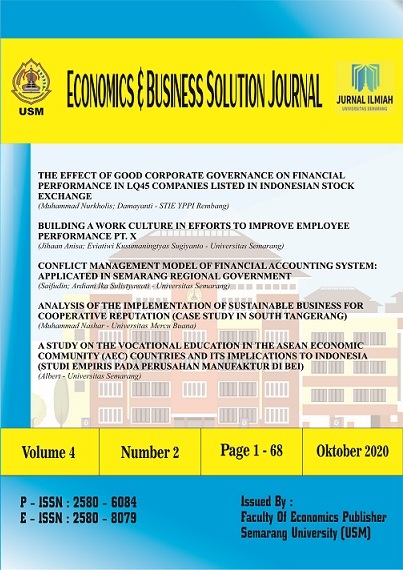Analysis of the Implementation of Sustainable Business for Cooperative Reputation (Case Study in South Tangerang)
DOI:
https://doi.org/10.26623/ebsj.v4i2.2792Keywords:
Sustainable business, reputation of cooperatives, South Tangerang cooperativesAbstract
Cooperatives as one of the drivers of the community's economy face many obstacles in its performance. Poor performance, incompetent human resources, and financial system that is still not good to be a fundamental weakness in the ability of cooperatives to compete in economic activities that are full of challenges today. Of the 150,333 cooperatives in Indonesia the level of success and sustainability of cooperatives is still very small. This study aims to analyze the application of sustainable business to cooperative reputation.in South Tangerang City Data Analysis Method uses Structural Equation Modeling-Partial Least Square (SEM-PLS).The Result of study The relationship between economic aspects and sustainable business is positive and significant. Relationship between social aspects and sustainable business is positive and significant. Relationship between environmental aspects and sustainable business is positive and significant. The relationship between Sustainable business and the reputation of the cooperative is positive and significant
References
Asif, F. 2011. Estimating the impact of Denison s 1996, What is the difference between organizational culture and organizational climate? A native s point of view on a decade of paradigm wars. Journal of Business Research. https://doi.org/10.1016/j.jbusres.2010.03.004
Baur, D., & Schmitz, H. P. 2012. Corporations and NGOs: When Accountability Leads to Co-optation. Journal of Business Ethics. https://doi.org/10.1007/s10551-011-1057-9
Bharwani, S., & Mathews, D. 2016. Customer service innovations in the Indian hospitality industry. Worldwide Hospitality and Tourism Themes. https://doi.org/10.1108/WHATT-04-2016-0020
Bocken, N., Short, S., Rana, P., & Evans, S. 2013. A value mapping tool for sustainable business modelling. Corporate Governance (Bingley). https://doi.org/10.1108/CG-06-2013-0078
Bravo, E. R., Santana, M., & Rodon, J. 2015. Information systems and performance: The role of technology, the task and the individual. Behaviour and Information Technology. https://doi.org/10.1080/0144929X.2014.934287
Bronfman, N. C., Jim ©nez, R. B., Ar ©valo, P. C., & Cifuentes, L. A. 2012. Understanding social acceptance of electricity generation sources. Energy Policy. https://doi.org/10.1016/j.enpol.2012.03.057
Centre for Global Higher Education, Al, S., Oman, N., Saeed, A., Jezaie, M., Assigned, D., €¦ Ursin, J. 2018. We rise to play a greater part: Students, Faculty, Staff, And Community Converge In Search Of Leadership From The Top. Open Journal of Leadership. https://doi.org/10.4236/ojl.2015.42006
Deegan, C. 2002. Introduction: The legitimising effect of social and environmental disclosures a theoretical foundation. Accounting, Auditing & Accountability Journal. https://doi.org/10.1108/09513570210435852
DeFond, M. L., & Jiambalvo, J., Brandon, D.M. Crabtree, A.D. and Maher, J. J., Kunitake, W., K ¶hler, A., Jang, H.J. and Lin, C. J., Fan, J. P. H., & Wong, T. J., €¦ (FRC), F. R. C. 2003. Quality Control for Audits of Historical Financial Information. The Accounting Review. https://doi.org/10.1111/1467-6281.00127
Eisenhard, J. L., & De Schepper, M. S. 2000. Approximate Life-Cycle Assessment in Conceptual Product Design. ASME Design Engineering Technical Conferences & Computers and Information in Engineering Conference. https://doi.org/DETC2000/DFM-14026
Ghozali, I. 2011. Aplikasi Analisis Multivariate dengan menggunakan SPSS. In Gramedia.
Hasanah, F., Yanto, H., & Dwi Handayani, B. 2014. Model Pengembangan Good Corporate Governance dan Sustainability Report Pada Perusahaan Yang Terdaftar di Bursa Efek Indonesia. Simposium Nasional Akuntansi XVII.
Jensen, M., & Meckling, W. 2012. Theory of the firm: Managerial behavior, agency costs, and ownership structure. In The Economic Nature of the Firm: A Reader, Third Edition. https://doi.org/10.1017/CBO9780511817410.023
Kang, J., Rhee, M., & Kang, K. H. 2010. Revisiting knowledge transfer: Effects of knowledge characteristics on organizational effort for knowledge transfer. Expert Systems with Applications. https://doi.org/10.1016/j.eswa.2010.05.072
Mahon, J., & Wartick, S. L. 2012. Corporate social performance profiling: Using multiple stakeholder perceptions to assess a corporate reputation. Journal of Public Affairs. https://doi.org/10.1002/pa.433
Martins, L. L., Rindova, V. P., & Greenbaum, B. E. 2015. Unlocking the hidden value of concepts: A cognitive approach to business model innovation. Strategic Entrepreneurship Journal. https://doi.org/10.1002/sej.1191
Miah, S. J., Vu, H. Q., Gammack, J., & McGrath, M. 2017. A Big Data Analytics Method for Tourist Behaviour Analysis. Information and Management. https://doi.org/10.1016/j.im.2016.11.011
Mokhtar, S. S. M., & Yusoff, R. Z. 2009. Exploring the relationship of key strategic orientations towards sustainable organizational performance. International Journal of Business and Management Science.
Moreno-Jim ©nez, J. M., Carde ±osa, J., Gallardo, C., & De La Villa-Moreno, M. . 2014. A new e-learning tool for cognitive democracies in the Knowledge Society. Computers in Human Behavior. https://doi.org/10.1016/j.chb.2013.04.027
Park, C.-Y. 2018. The Influence on the Reputation of the Company and the Purchasing Behavior of Consumers Using the Franchise Image. Korean Logistics Research Association. https://doi.org/10.17825/klr.2018.28.1.37
Puentes Poyatos, R., & Velasco G ¡mez, M. D. M. 2009. Cooperative Societies in the Face of New Sources of Employment and Corporate Social Responsibility As a Means of Sustainable Development. REVESCO. Revista de Estudios Cooperativos.
Ramos-Gonz ¡lez, M. del M., Rubio-Andr ©s, M., & Sastre-Castillo, M. . 2017. Building corporate reputation through sustainable entrepreneurship: The mediating effect of ethical behavior. Sustainability (Switzerland). https://doi.org/10.3390/su9091663
Robinson, R. B., & Pearce, J. A. 2011. Research Thrusts in Small Firm Strategic Planning. Academy of Management Review. https://doi.org/10.5465/amr.1984.4278109
Santos-Vijande, L., Sanzo-P ©rez, M. J., Trespalacios Guti ©rrez, J. A., & Garc a Rodr guez, N. 2012. Marketing Capabilities Development in Small and Medium Enterprises: Implications for Performance. Journal of CENTRUM Cathedra, 5(1), 24 42. Retrieved from http://ssrn.com/abstract=2018367
Teece, D. J. 2010. Business models, business strategy and innovation. Long Range Planning. https://doi.org/10.1016/j.lrp.2009.07.003
Vilaseca-Requena, J., Torrent-Sellens, J., & Jim ©nez-Zarco, A. I. 2007. ICT use in marketing as innovation success factor: Enhancing cooperation in new product development processes. European Journal of Innovation Management. https://doi.org/10.1108/14601060710745297
Wang, S., & Noe, R. A. 2010. Knowledge sharing: A review and directions for future research. Human Resource Management Review. https://doi.org/10.1016/j.hrmr.2009.10.001
Published
Issue
Section
License
The journal holds the copyright for each article published with work licensed simultaneously under a Creative Commons Attribution 4.0 International License, which allows others to share the work with an acknowledgment of the authorship and early publication of the work in this journal.







